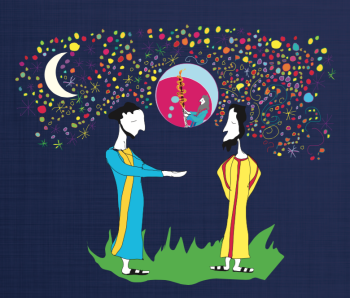
This week's lesson comes from John 3:1-21 where a Pharisee named Nicodemus when to visit Jesus in the cover of the night. He had some serious questions for Jesus and what Jesus says to him foreshadows what was to come. You can read the story from an ESV bible or you can turn to Story 87 in the Gospel Story Bible. Be sure to download this week's Family Worship Guide for conversation guide, prayer suggestions and this week's catechism questions!
Here are a few teaching points from the Gospel Story Curriculum to help you guide the conversations surrounding this story with your children:
Unless you are born again you cannot see the kingdom of God—Nicodemus, a Pharisee, came to Jesus at night under cover of darkness to learn more about him. Nicodemus began by saying that he believed Jesus had been sent by God. Jesus replied to Nicodemus with a riddle-like statement: “Unless one is born again he cannot see the kingdom of God” (John 3:3). The Jews believed one had to obey the Law to enter the kingdom of heaven. But by teaching that one had to be “born again” or “born from above,” Jesus was saying that one cannot get to heaven by doing good works. Nicodemus replied with incredulity touching on sarcasm, “How can a man be born when he is old?” Jesus repeated his statement and assured Nicodemus that it was by God’s work—by the Holy Spirit’s work—and not one’s own work that a person enters the kingdom of heaven. Nicodemus likely left that night a bit confused, but in the end there is evidence that he believed. While here in this passage Nicodemus came at night so that the other Pharisees would not see him, after Jesus’ death on the cross he came boldly with Joseph of Arimathea to claim Jesus’ body (John 19:39). It seems that the Spirit fell upon Nicodemus and he was “born again.”
Apart from Christ, man stands condemned—John 3:18 tells us that we all stand before God as condemned sinners. Sometimes people will say, “I can’t believe a loving God would send men to hell.” They wrongly think that people are inherently good. In reality, we are all sinners, rebels against God. Our status as sinners condemns us and our breaking of the Law confirms that we live as God’s enemies and are condemned already.
Wickedness hates the light—John tells us that “light has come into the world” (John 3:19), and that people hate the light because their evil deeds are exposed by the light. Not only are we sinners who stand condemned, we are incapable of seeing the light of God unless we are born again. In our sin we hate the light. Like someone who has been trapped in a dark cave can’t stand the brightness of his rescuer’s flashlight, neither can sin stand the light of God’s truth. We reject God, until by his Spirit he transforms us. Later in John 8:12 we read that Jesus said, “I am the light of the world. Whoever follows me will not walk in darkness, but will have the light of life.”
Teach your children and meditate on how this story fits into God's grand plan of redemption:
story fits into God's grand plan of redemption:
The third chapter of John introduces the idea of the new birth: being born again. Like our first birth, this new birth is not something we can do for ourselves; it is something that God does. When the Holy Spirit makes us alive or born again, we are given a new heart, and our eyes are opened to believe the truth of the gospel, that Jesus Christ was “lifted up” (John 3:14) on the cross so that all who look upon him for their salvation will be saved.
Moses lifting up the bronze serpent in the wilderness (Numbers 21:8–9) was a picture of how God planned to save his people from their sin. Bitten by the snakes, the Israelites could do nothing to save themselves. But, because of the grace and mercy of God, if they looked to the serpent on the pole, God healed them. Nicodemus was a teacher of Israel yet he failed to see that our salvation is by the mercy and grace of God, not by our own works. Perhaps it was when he saw Jesus “lifted up” on the cross that he finally understood and believed.


Comments
Login/Register to leave a comment